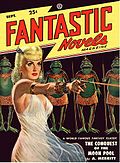Wikipedia:Today's featured article
|
Today's featured article Each day, a summary (roughly 975 characters long) of one of Wikipedia's featured articles (FAs) appears at the top of the Main Page as Today's Featured Article (TFA). The Main Page is viewed about 4.7 million times daily. TFAs are scheduled by the TFA coordinators: Wehwalt, Gog the Mild and SchroCat. WP:TFAA displays the current month, with easy navigation to other months. If you notice an error in an upcoming TFA summary, please feel free to fix it yourself; if the mistake is in today's or tomorrow's summary, please leave a message at WP:ERRORS so an administrator can fix it. Articles can be nominated for TFA at the TFA requests page, and articles with a date connection within the next year can be suggested at the TFA pending page. Feel free to bring questions and comments to the TFA talk page, and you can ping all the TFA coordinators by adding " |
Featured article candidates (FAC): Featured article review (FAR): Today's featured article (TFA):
Featured article tools: |
From today's featured article
Edgar Towner (19 April 1890 – 18 August 1972) was an Australian recipient of the Victoria Cross, awarded for his actions during an attack on Mont Saint-Quentin during World War I. Born in Queensland, Towner enlisted in the Australian Imperial Force in 1915. He served in Egypt with the 25th Battalion until his unit was sent to the Western Front. He then transferred to the 2nd Machine Gun Battalion where he was commissioned as a lieutenant. In June 1918, Towner led a machine gun section attack near Morlancourt while under heavy fire, for which he was awarded the Military Cross. In September, he was involved in the Allied counteroffensive that broke the German lines at Mont Saint-Quentin and Péronne. Towner returned to Australia after being discharged in August 1919. He was appointed a director of the Russleigh Pastoral Company and re-enlisted during World War II, when he was promoted to major. He was awarded the Dr Thomson Foundation Gold Medal in 1956 for his geographical work. (Full article...)
From tomorrow's featured article
Fantastic Novels was an American science-fiction and fantasy pulp magazine published by the Munsey Company of New York from 1940 to 1941, and by Popular Publications from 1948 to 1951. It was launched as a bimonthly companion magazine to Famous Fantastic Mysteries in response to heavy demand for book-length reprints of stories from pulp magazines such as Amazing Stories and Argosy. It ran science-fiction and fantasy classics from earlier decades, including novels by A. Merritt, George Allan England, Victor Rousseau and others, and occasionally published reprints of more recent work, such as Earth's Last Citadel by Henry Kuttner and C. L. Moore. There were five issues in the magazine's first incarnation and another twenty in the revived version from Popular Publications, along with seventeen Canadian and two British reprints. Mary Gnaedinger edited both series; her interest in reprinting Merritt's work helped make him one of the better-known fantasy writers of the era. (Full article...)
From the day after tomorrow's featured article
Dr. Jekyll and Mr. Hyde is a play written by Thomas Russell Sullivan in collaboration with the actor Richard Mansfield (pictured). It is an adaptation of Strange Case of Dr Jekyll and Mr Hyde, an 1886 novella by Robert Louis Stevenson. The story focuses on the respected London doctor Henry Jekyll, who uses a potion to transform into Edward Hyde, a loathsome criminal. Intrigued by the opportunity to play a dual role, Mansfield secured the stage rights and asked Sullivan to write the adaptation. The play debuted in Boston on May 9, 1887, and opened on Broadway that September. Mansfield's performance was acclaimed by critics. The play opened in London in August 1888, just before the first Jack the Ripper murders. The press compared the murderer to the Jekyll character, and Mansfield was suggested as a suspect. Mansfield performed the play until shortly before his death in 1907. Sullivan made changes from Stevenson's story that have been adopted by subsequent adaptations, including film versions. (Full article...)




